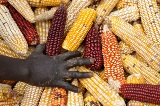Malawi
News

We Can All Help Reduce Food Loss and Waste | UN Chronicle
28/09/2022
Reducing food loss and waste represents a “triple-win” opportunity—for the climate, for food security and for the sustainability of our food systems. It must be a priority in these times of rising food insecurity, malnutrition and hunger across the globe.
For many of us on the planet tod...
Articles
Exploring the complex relationships between food loss and waste, climate change and the environment to support informed sustainable food system transformation decisions with a focus on sub-Saharan Africa
04/05/2023
Food loss and waste (FLW) reduction is key to transforming food systems to deliver food security, while responding to climate change and reducing other environmental impacts. Food production and postharvest systems differ with location, reflecting the diversity of agroecological and socio-economi...
Africa’s Informal Sector and COVID-19: Is this an Opportunity to Revisit the Forgotten 80%?
20/03/2020
Since the first case was confirmed in Africa in late February, numbers have grown to over 4,500 cases in...
Events
16/ 10
2023
World Food Day 2023 - Water is Life. Water is Food
Rome (Italy), Hybrid Event, 16/10/2023
This year World Food Day theme is “Water is life, water is food. Leave no one behind”. It spotlights how water is essential to life on Earth and the foundation of our food.
As rapid population growth, urbanization, economic development, and climate change put the planet’s water resources under increasing stress, the campaign will look at solutions and call for action to produce more fo...
12/ 12
2022
Masterclass on Reducing Food Loss and Waste Targeting Youth
Virtual Event, 12/12/2022
A Food Loss and Waste Master class will be held in December 2022. This virtual event will be addressed to youth who want to discover more about the causes of food loss and waste and solutions to achieving the SDG 12.3 target.
19/ 11
2014
FAO FOOD LOSS REDUCTION – PARTNERSHIP AND CAPACITY BUILDING
Nairobi (Kenya), 19/11/2014
In the framework of the Food Processing and Packaging Exposyum (FPPE) 2014 on 19 November (9:00-17:00 hrs) FAO will held a one-day event on FOOD LOSS REDUCTION – PARTNERSHIP AND CAPACITY BUILDING Session 1: Learning from Development Partners
Projects
| Title | Global initiative on food loss and waste reduction |
|---|---|
| Project Code | none |
| Donor | Ireland |
| SDG(S) |
Publications

Territorial markets for nutrition. Unleashing the potential of territorial markets for food security, healthier diets, and better nutrition
31/12/2022
Diets are not only determined by individual behaviours and choices, but are also highly influenced by the food environments in which people make their food purchases. Territorial markets, by the quality and quantity of food they sell and the prices at which they sell it, exert a fundamental influence on dietary patterns, and are crucial to the food security and nutrition of the communities they serve.

Food loss analysis: causes and solutions - Case study on the maize value chain in the Republic of Malawi | Factsheet
01/09/2018
To improve global, regional and local knowledge about the underlying reasons for food loss, as well as to assess where critical loss points occur, FAO undertook a series of case studies involving numerous food supply chains in developing countries. Utilizing a defined food loss and waste analysis framework.

Food loss analysis: causes and solutions - Case study on the maize value chain in the Republic of Malawi
01/09/2018
To improve global, regional and local knowledge about the underlying reasons for food loss, as well as to assess where critical loss points occur, FAO undertook a series of case studies involving numerous food supply chains in developing countries. Utilizing a defined food loss and waste analysis framework.
Multimedia
Stemming Aflatoxin pre- and post-harvest waste in the groundnut value chain (GnVC)
19/05/2016
FANRAPAN regional climate-smart agriculture policy dialogue hosted in Lusaka in August 2015 and some practical ways to reduce pre- and post-harvest losses in the Zambia and Malawi experiences
